Our Newsletters | Juch'uy Willaykunanchik
Newsletter Archive Unlearning Hour
K’acha Willaykuna Our Distance Unlearning Hour – Autumn 2020
(Note: This was a collaborative Google Document which can be viewed here.)
Thanks to all for two very productive sessions of this semester’s Our Distance Unlearning Hour. This is a forum for reflection on our experiences and unlearning practices, exchange of ideas on decolonial theories and methods, and engagement with Indigenous ways of knowing and being in the world as these inform our understandings and practices. The group welcomes interested faculty, graduate and undergraduate students, staff, members of the broader community, international indigenous community partners… -- All are welcome.
This document is an experiment in summarizing our session discussions and capturing additional reflections as a group. You should feel free to respond to any statements as prompts, add your comments and reflections at any point in the document. Rather than produce a newsletter similar to the ones from previous semesters, we hope this experiment in collective writing can help us continue the conversation beyond our designated hour and generate writing we might later draw on for our website, position pieces, annual reports, interventions in the broader discussions on diversity and inclusion, etc. So please jump in!
1. Our Distance Unlearning Hour 09/11/2020
Session Zoom Recording on YouTube
Comments/Reflections:
2. Pachaysana Webinar 09/18/2020
Webinar session Zoom Recording
https://osu.zoom.us/rec/share/rAT_nxa7PFZ1wUyVG6oNvmu2715YtT9rsCYFjh_wcozlvHsPxjUJ9MXW8pi4JJoO.sQWBK04HasPOnziV?startTime=1600435943000
Comments/Reflections:
3. Our Distance Unlearning Hour 09/25/2020
Session Zoom Recording
https://osu.zoom.us/rec/share/8dZgU2ybH1IOEh__6QxmmJB50tTp7-1U8aHpeEBhqzBU9ulz4r5k3pgUvHgVLoxu.s6shApO0aM6IQo0K?startTime=1601040871000
Comments/Reflections:
- Richard started our 09/25/2020 session of Our Distance Unlearning Hour with a profound 8 minute and 46 second listening experience –María Chavez’s “Rain of Applause” that connected us to conversations on decolonial listening and bridging with discussions of how we can maintain the tension of mutual care in the context of racial/colonial violence and Black Lives Matter.
- Our collaboration with Cassandra Press centers precisely on themes of “erasure” connecting, from an arts perspective, Black Lives Matter movements in the US with Indigenous Resistance Movements in the Brazilian Amazon.
- This resonated strongly with GAH Fellows talks on transnational models/frameworks that focus on the intersectionality of the respective conditions and situations of minority peoples around the globe.
- How might we redefine a collective “we” beyond race, nationality, gender, profession, class…
- How do we conceive of “belonging”?
- We also reflected on the Pachaysana Webinar, in particular the embodied approach to land acknowledgment in stark contrast with the abbreviated verbal acknowledgments we typically hear and use.
- Here we brought in Arvcúken Noquisi’s (OSU undergraduate student) compelling artist statement and commanding art project for a mural installation on High Street later this autumn.
Arvcúken ᏧᎸᏌᏓ ᏃᏈᏏ cvhocefkv tos. Mv nak-vhakv momet heleswv en hecatskes os. Heyv ekvnv este-cate os.
Space is made of shapes and layers. Cufe momet Yvhv-lanuce ehakes. Shapes connect to other shapes, layers dance with other layers. Cufe and Yvhv-lanuce hide in the patterns of space. Existence becomes interpretive, elusive.
This is Native land. The ancestral history and knowledge of the Indigenous people forced away from their connection to this land are obscured by colonial narratives and control of space. The Ohio State University sits on land taken from the Shawnee, Lenape, Miami, Wyandotte, Potawatomi, Peoria, Ojibwe, Seneca, and Cherokee peoples –- all removed from Ohio by the Indian Removal Act of 1830.
The tribes named in this mural are those originally referenced in the 2019 OSU Multicultural Center Land Acknowledgement (updated in 2020 by Melissa Beard-Jacob). Many of the tribes listed above had already been displaced from original homelands and pushed further west into Ohio by white settlers.
Heleswv vhayis. What is elusive hides behind what can never be ignored again. This is a demand.
This is Native Land
2020
- This prompted discussion about indigenous lands gifted to universities to establish endowments. Connections to ongoing wealth extracted from the appropriation of indigenous lands.
- The Pachaysana Webinar also underscored the high stakes of the concept of “inclusion” as Webinar facilitators challenged the framework of “inclusion” and invited considerations not of “inclusion” but rather a different type of alignment.
- Issues of logic of the West and how it sets the parameters of inclusion and accommodation, normalizing the terms of engagement.
- What about issues of inclusivity and exclusivity of language and terminology?
- Beyond the potentially “off-putting” academic language and terminology, how do we fold this discussion into working with Indigenous languages, the tension between exclusivity and access they sustain vis-à-vis settler colonialist language/culture; issues of translation and translatability; understanding achieved by ways other than language.
- Use of Indigenous languages as action in itself.
- RF -- the right to opacity; limitations of working exclusively in shared spaces; need for independent spaces of work; safe spaces of expression not subject to analysis, interpretation or gaze of others.
- As we grapple with new, encompassing frameworks of diversity that reject segmented and segregated spaces of inclusion, and engage proposals that the “whole structure needs to change” we are faced with what radical change looks like in practice.
- How might we intervene in broader debates on diversity and inclusion from our experiences/discussions/commitment with indigenous epistemologies as ways of doing, knowing, meaning-making, understanding and living in the world?
**Save the date/register for Epistemic Workshop #1 this Friday, Oct. 2 at 9:30 a.m.**
--Full calendar of upcoming events and links for previous session recordings below--
Upcoming Events and Workshops:
Please visit this site to register for the Pachaysana Institute workshops.
"Epistemic Justice" Workshop Series, presented by the Pachaysana Institute
The Center for Latin American Studies, in partnership with the K'acha Willaykuna: Andean & Amazonia Indigenous Arts & Humanities Collaboration and the Department of Spanish and Portuguese, is excited to host a series of virtual workshops on Epistemic Justice and Identidad y Pacha, presented by the Pachaysana Institute.
Throughout autumn semester, this series will help us explore and process the complex moments we're living in, as well as dream towards a better future. The schedule of events includes workshops and reflections after each session. The series is designed for ongoing participation throughout the semester, but attendees are not required to attend each session (although it is encouraged).
Complete Schedule of Events:
- Epistemic Justice Workshop #1: Friday, October 2, 9:30 - 11:00: AM -- From the perspective of "voice", participants will work on poetry/spoken word activities and will move from the individual to the collective voice, demonstrating the importance of radical listening in epistemic justice.
- Reflection on Workshop #1: Friday, October 9, 9:30 - 10:30 AM during Our Distance Unlearning Hour
- Special Workshop: Identidad y Pacha: Friday, October 9, 2:20 - 3:40 PM -- As part of the Colloquium Series in the Department of Spanish and Portuguese, this Spanish-language workshop will link the traditions, practices, and oral memory of Andean peoples to our current lived realities, and puts theory to practice by offering tools that help us engage the natural world and our communities with new perspectives.
- Epistemic Justice Workshop #2: Friday, October 23, 9:30 - 11:00 AM -- This workshop explores epistemic justice from "embodiment," referring to our bodies as sources of knowledge and ways of expressing knowledge.
- Reflection on Workshop #2: Friday, October 30, 9:30 - 10:30 AM during Our Distance Unlearning Hour
- Epistemic Justice Workshop #3: Friday, November 13, 9:30 - 11:00 AM -- This workshop looks at epistemic justice from "space", referring to how ways of knowing come from our relationship to the world (and nature itself), and is not solely an anthropocentric experience.
- Reflection on Workshop #3: Friday, November 20, 9:30 - 11:00 AM during Our Distance Unlearning Hour
Please use the following links to access the workshops and reflections:
Webinar/Workshop Link: Recurring sessions for Fall 2020
https://osu.zoom.us/j/91924512436?pwd=ZHZjcm9SZ0x5azJYcGlkUU1qV1F4UT09
Meeting ID: 919 2451 2436
Passcode: 786977
Reflection Link: Recurring sessions for Fall 2020
https://osu.zoom.us/j/95020638257?pwd=cDVyMG5LVEUxM3BjOTRJd3lzaStFZz09
Meeting ID: 950 2063 8257
Passcode: 338455
This workshop series is co-sponsored by the Center for Latin American Studies, Department of Spanish and Portuguese, and the K’acha Willaykuna: Andean & Amazonia Indigenous Arts & Humanities Collaboration, funded through the Global Arts and Humanities Discovery Theme.
Last Friday (February 28th), we had our sixth meeting of the K’acha Willaykuna Our Unlearning Hour. (We meet every Friday, 9:30-10:30am, at the Heirloom Café in the Wexner Center for the Arts). During our meeting, we focused our discussion on a very specific topic: the potential commission by OSU of an artwork by Athena LaTocha (Hunkpapa Lakota/Ojibway). LaTocha is visiting OSU later this week and she will be meeting with the University Arts and Memorials Committee to discuss the commission. Given that the university was in discussions with an Indigenous artist about including their work in the OSU collection, we used our hour together to think through the implications.
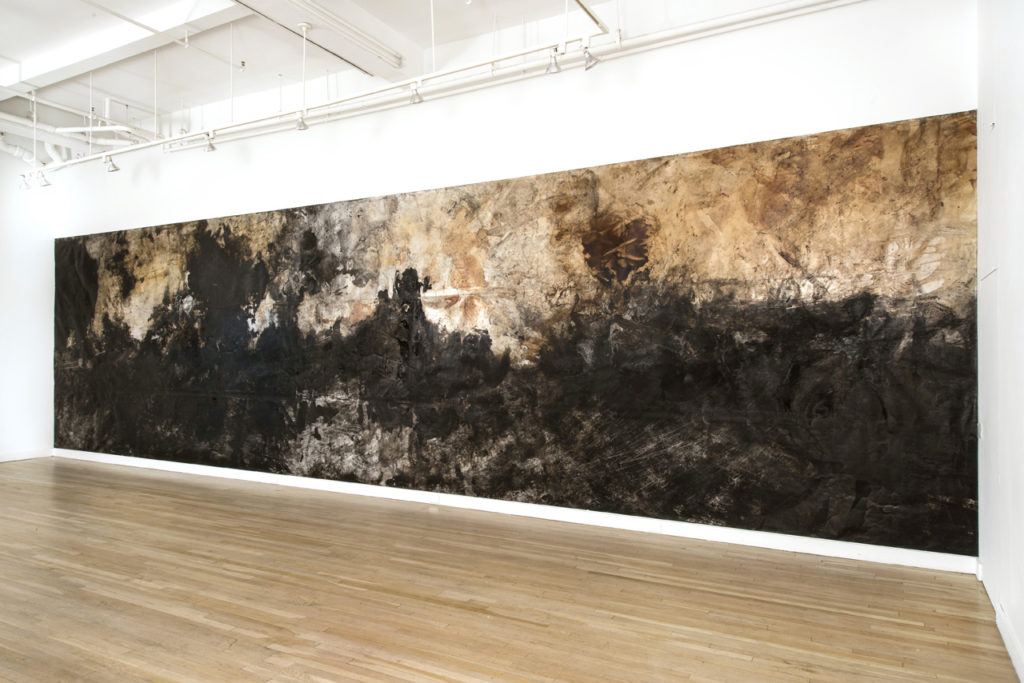
Athena LaTocha Untitled 2015, sumi and walnut ink, shellac on paper, 124 x 452 inches
We started by sharing LaTocha’s statement about her work:
Having grown up in Alaska, my understanding of the land was influenced by both the rugged monumentality of the terrain and the impact of the oil and gas industry upon the land. To this day, I feel a natural affinity for places and things that evoke those memories, such as the mountains and deserts of the southwest, and excavation sites and earthmoving equipment found in the industrial landscape.
I unfurl large rolls of paper on the floor and immerse myself in the painting, much like being in the landscape. Working from the inside out, I disperse a palette of earth-toned inks with distilled water and industrial solvents, and use aggressive tools such as wire brushes, scrap metal, and reclaimed tire shreds to push the ink around. Surrounded on all sides by the expanse of paper, I move through the work as if I am traversing the terrain.
Layla Muchnik-Benali expressed her excitement about this commission, but was curious about how we could make the whole commissioning process more transparent and open – as this was the first she’d heard about it. Micah Unzueta proposed that we could use this commission as a mechanism to enact a permanent change to the committee structure, bringing local Indigenous voices to the process. This question of access then turned to nature and location of the work. Anna Freeman, responding to the use of materials by LaTocha in her work and its textured surfaces, wondered there could be a spot that made for people to touch. Lexi Breitenstine, who identified as a ‘science student’, spoke of how great it would be to have an artwork in the area of campus designated for Athena’s work (Zone 6) as it would engage a broader non-artistic audience. She also appreciated how Athena wanted to engage with Indigenous groups in Ohio, using the analogy of a healthcare administrator taking advice from patients. On the abstract nature of LaTocha’s work, Brooker Beeler referenced an article from a class called ‘Rock and Remembrance’ which challenged preconceptions about abstraction in Indigenous art making (is it abstract if colonizers don’t understand it?). Finally, we all discussed whether it should be an aim of the K’acha Willaykuna group to make a proposal to the Art and Memorials Committee for an artwork by an Andean or Amazonian Indigenous artist. Richard Fletcher, who is a member of the committee, agreed to bring these topics to the committee when they meet this week and also to share them with LaTocha directly. As part of her visit, LaTocha will be attending the artist talks in the Fine Arts Library on March 4, 2-3:30pm along with Marti Chaatsmith, Associate Director at the Newark Earthworks Center (NEC) at The Ohio State University at Newark. Stop by and say hello!
This week Our Unlearning Hour met at the Thompson Library for 30 minutes in order to allow participants to attend “The Americas before 1620: Interdisciplinary Perspectives on Indigenous Cultures, Colonialism and Slavery” Symposium.
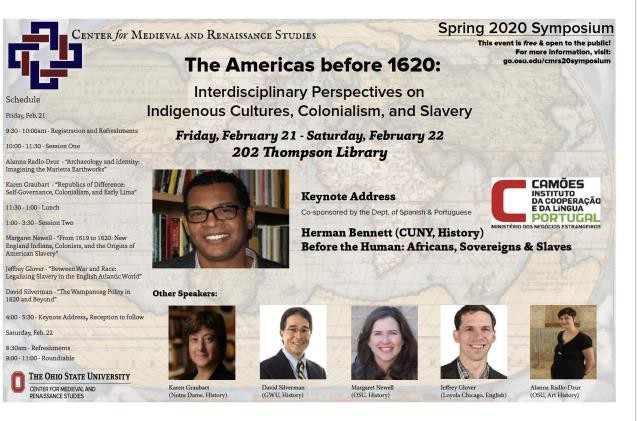
Alanna Radlo Dzur, our K’acha Willaykuna GRA in 2019, delivered a talk on Imagining the Marietta Earthworks.
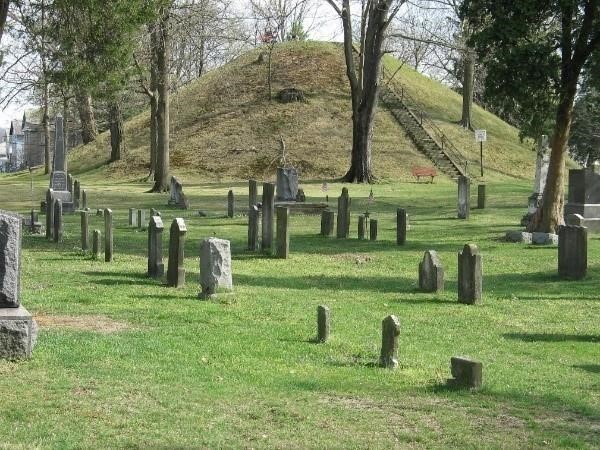
This week our conversation turned to “Cultures of Improvisation” as we reflected on Dr. Subhendu Ghosh’s (Univ. of Delhi) visit to Ohio State, his classroom interventions and participation in The Unlearning Hour last week. As we compared classical and folk music approaches to participation, learning and performance,
Juan Zevallos commented on the “willingness of Andean musicians to jump in” and also noted that some Andean musical pieces can last up to an hour. Michelle Wibbelsman reflected on the significance of this timing and informal structure for players to achieve a sense of “flow” as a group (Turino) and commented on challenges along these lines in the Andean Music Ensemble and the alternative pedagogies she uses to draw students into Andean cultural dispositions of “jumping in” in participatory fashion.
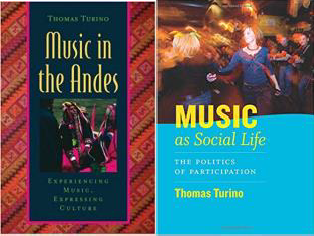
Lexi Breitenstine, one our stellar undergraduates, joined the conversation this week and contributed a reflection on shyness or reluctance among students to explore beyond their comfort zones, mentioning institutional practices and expectations (like grades, more structured learning in certain fields, timing of classes and presentations) that sometimes inhibit our “willingness to jump in” or venture beyond our field. Juan Zevallos described his experiences at Temple University with minority students who were often more expressive and vocal about their opinions. Along with Ann Hidalgo, we also discussed cultural notions/expectations of leadership and how this cultural ideal can at the same time potentially dampen the initiative of a group.
In other updates and news, the Knowledge Equity and Legacy Preservation Working Group spearheaded by Pamela Espinosa de los Monteros and Eric Johnson is off to a great start with attendance of 8-10 participants for its first session. Reading for the group includes Caroline Shipley’s article titled: “This is not translation of the Accompanying Text in Quechua” in the latest ¿Qué Pasa, Ohio State? Issue. This WG along with other K’acha Willaykuna WGs are preparing an exhibit of Festival Masks at Thompson Library (Spring 2020) and Lakewood Public Library (Cleveland March-August 2020) including a talk by OSU alumnus and donor Mark Gordon and a panel discussion including Lisa Voigt, Dorry Noyes, Richard Fletcher and Michelle Wibbelsman on March 17, 2020. So save the date! The next meeting of the Knowledge Equity Group is March 17.
Also save the date on March 4, 5:15-7:15 for a screening of The Bridge Master’s Daughter (circulated by Juan Zevallos)
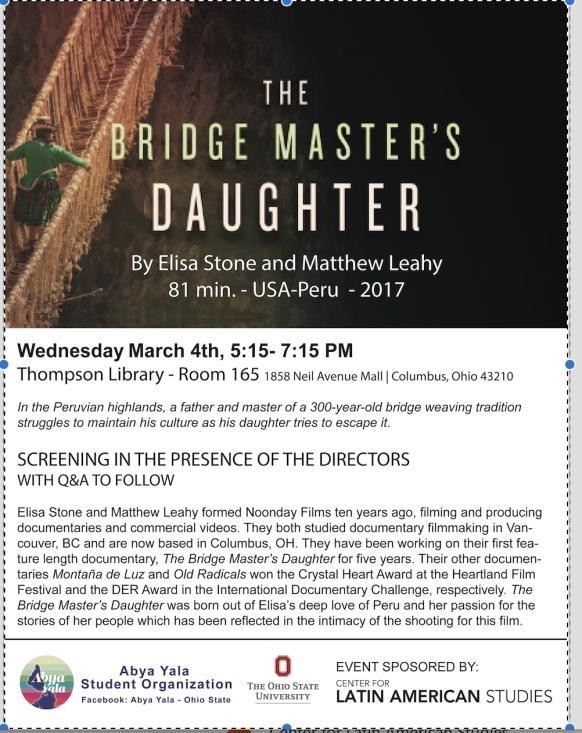
Last Friday (February 14th) at Our Unlearning Hour, our regular attendees (Tania Espinales Correa, Anna Freeman, Guillermo Paredes Orozco, Richard Fletcher – for only the first half hour – so thanks to Anna and Tania for the notes on which this newsletter is based) were joined by several new faces (Eric Johnson, Moon Kim, Andrew Quigley, Julia Allwein, Indigo London) and a guest (Subhendu Ghosh). We introduced ourselves through sharing our experiences from the past week and what he had unlearned. We spoke about adjusting our work life balance, returning to our ‘child-self’, dealing with culture shock, and undergoing anti-racist organizer training.
Subhendu spoke of his recent travels in the US since arriving from Delhi, India and how he was here to learn, and therefore unlearn, Indian norms and conventions, especially in campaigning for a secular and multicultural society, in the face of a dominant Hindu monoculture. Subhendu provided historical context (from British imperialism, Gandhi, Indo-Pakistan war) and its consequences (since 2014, Hindu party has been in power, and as of 2019, efforts to change the constitution, with increasing violence against minorities), as part of a campaign to unlearn the concept of Hindutva nationalism, saying that, “Right at this moment we need a little bit of Gandhi!" Tania then asked him about how he used music as a way to resist and unlearn? Subhendu replied that you need to bring music to the people. You go to the homes of those who have lost someone or faced trauma. You sit with them and be with them. Talking is not as effective but singing and playing music helps them to know that they are not alone. People also gather and sing in the streets. These are expressions of solidarity. You have to be able to incorporate change at a political level (i.e. the constitution) and as well as at a psychological/cultural level. Two new voices to our group (Julia and Indigo) then asked about the presence of international solidarity, and the interaction between so-called ‘sub’ cultural topics, compared to others. In addition to pointing out how Noam Chomsky was protesting alongside Indian intellectuals (from fiction writers to economists), Subhendu recommended checking out NDTV for more accurate information about the political climate in India.
Links:
Subhendu Ghosh’s YouTube Channel; Subhendu Ghosh’s Band
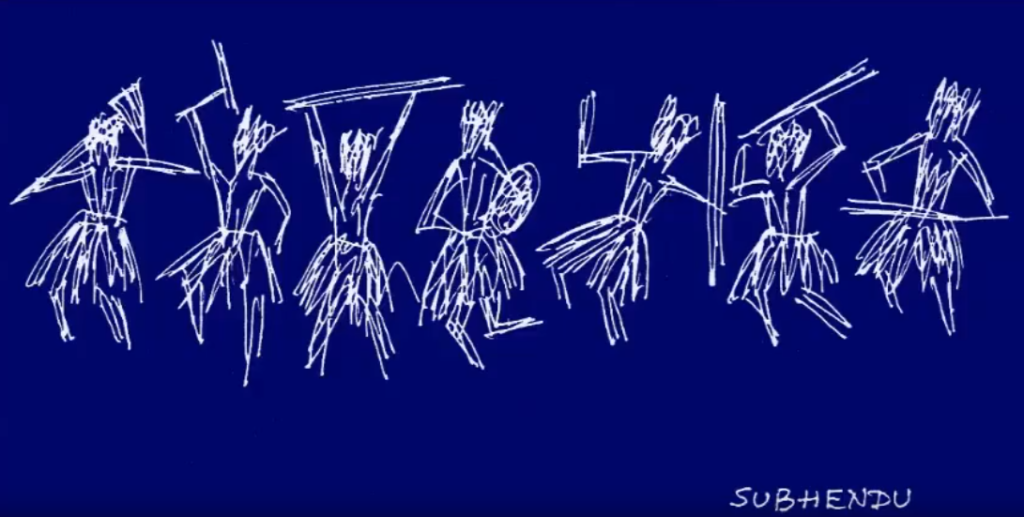
In this week’s Our Unlearning Hour, we discussed methods of unlearning. The question transformed from what have we learned, and what is unlearning, to how can we unlearn. Dana Luciano, a new addition to our group, shared that she believed that it had to do with a more conscious awareness of the world around us, our role with in it, and an ability to question social constructs instead of accepting them as concrete. In this reflection, she cited David Foster Wallace’s commencement address to Kenyon College, entitled “This is Water.” The speech begins with a short anecdote about two fish swimming along, and they pass an older fish who says, “morning boys, how’s the water?” After that fish swims on, the two fish look at each other, and one asks “what is water?” The most obvious, important realities are, indeed, often the ones that are hardest to see. Learning to see them is an active process, just as unlearning is an intensely active process that requires a reconfiguration of our passively accepted construct of reality. Video of the speech is found here.
Tania Espinales Correa shared a story ("La historia de las palabras” appears in pages 62-67 of the link) and reflected on how unlearning is not the equivalent of forgetting because it is not something that happens passively. To unlearn is to learn how to be our-other-selves. It is a way to be a mirror. Tania shared how certain Maya languages reflect this idea of mirroring in their capacity as “lenguas ergativas” underscoring that “learning” or “teaching” are not unidirectional processes, but rather actions that imply and require dialogue with an other. This is the link to Walter Mignolo’s article that inspired her reflection.
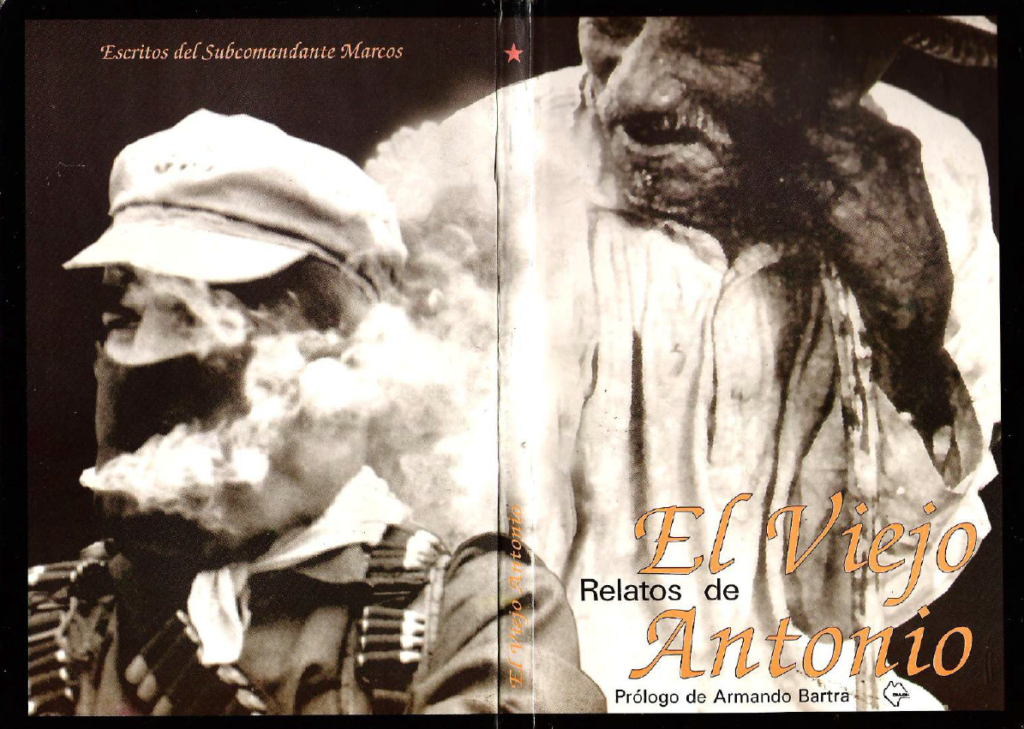
Michelle Wibbelsman pointed out that Andean languages and dynamics, in particular ritual expressions reflect a similar mirrored pattern. Tania and Michelle shared how certain exercises in the Andean Music Ensemble class attempt to put into practice some of these methods. https://sppo.osu.edu/andean-music-ensemble ; https://clas.osu.edu/outreach/andean-ensemble .
Ann Hidalgo reflected on the fact that unlearning as part of decolonial methods is not so much about changing habits, but more humbly, at least at the beginning, about recognizing patterns and rendering explicit our cultural habits. Along these lines we referenced the Pachaysana Institute’s approach to “rehearsing change” as a necessary step prior to implementing change (“Rehearsing Change” is an OSU study abroad program in Amazonia)
Over the weekend, Pamela Espinosa de los Monteros, Eric Johnson, Stephanie Porrata and Michelle Wibbelsman participated in the ONE Community Conference with a K-12 workshop “Portals to the Past and Present: Instructional pedagogy with primary sources” featuring the Rare Books and Manuscripts Cervantes Collection and the Andean and Amazonian Cultural Artifact Collection.
The next meeting of Our Unlearning Hour will take place on Friday, February 14, 9:30-10:30 in the Heirloom Café (Wexner Center for the Arts). We will have the pleasure of having Dr. Subhendu Ghosh from the University of Delhi join us for the conversation.
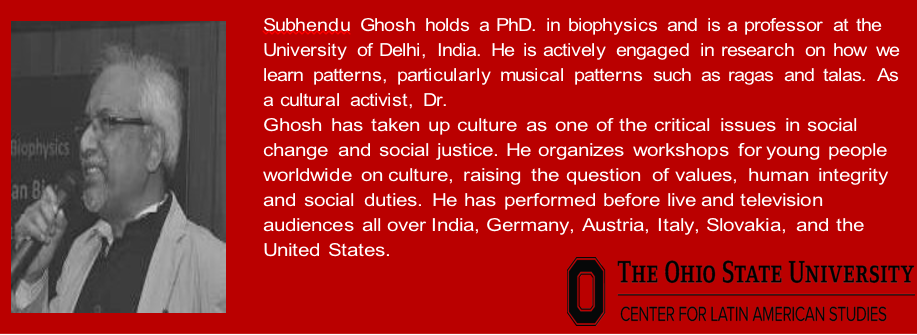
Last Friday (January 31st), we had our second meeting of the K’acha Willaykuna Our Unlearning Hour. (We meet every Friday, 9:30-10:30am, at the Heirloom Café in the Wexner Center for the Arts – come and join us!). During our meeting, we welcomed new members (Alex Adcock & Kat Arndt) and reflected on the past week, as well as older experiences and projects (including Tania Espinales Correa’s former position at the National Fund for Culture and Arts (Fondo Nacional para la Cultura y las Artes, FONCA) in Mexico City). We also shared our thoughts on the topic of masks, in general and in terms of last semester’s performance by K'acha Willaykuna Artist in Residence Sebastián Calfuqueo Aliste. Ann Hidalgo shared an article she had read in the NYT of projections of Abraham Lincoln (Hilarie M. Sheets (2020) ‘A Monument Man Gives Memorials New Stories to Tell’), while Richard Fletcher described his Mask/Media project in his classes this semester, as well as the Gauri Gill exhibition at CMA and Candice Hopkins on masks. Michelle Wibbelsman reflected on the raw materials of masks, as well in terms of the Andean concept of chaka (ladder/bridge). She also brought up the intriguing issue of the voice, specifically the high-pitched voice for a soul speaking through the mask. In our discussion of Sebastián Calfuqueo Aliste’s performance and the idea of the mask, Tania Espinales Correa asked how is nudity a kind of mask and what is behind nudity for a transgender artist? Michelle Wibbelsman commented on the use of the wig and the wearing high heels as a form of masking, as well as the use of the phrase NOT ME/KNOT ME (anuda me) in the performance. Guillermo Paredes Orozco asked if the students seeming to back away during the performance was a result of the difference of the ‘other’ (as a remnant of 19th century European constructions of the ‘savage’) or of something else?
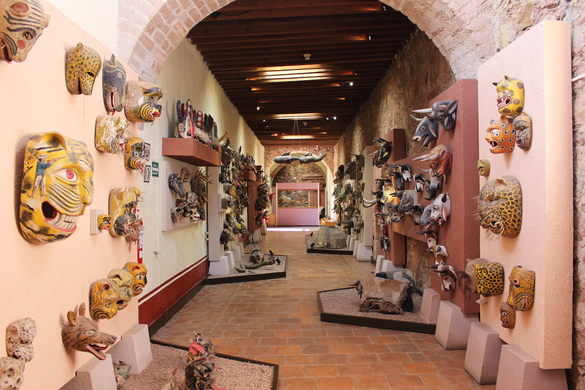
Museo Rafael Coronel has a collection of thousands of masks (pictured above) – shared by Tania Espinales Correa
Readings
- Caroline Shipley (2020) ‘This is Not a Translation of the Accompanying Text in Quechua’ – shared by Tania Espinales Correa
Links
- OhioHabla Episodio 95 Artista Mapuche: Sebastián Calfuqueo Aliste – shared by Michelle Wibbelsman
- First Knowledge Equity Working Group meeting will take place February 11th, 2020 at 2:30-4pm in Thompson Library Room 204 (organized by Pamela Espinosa de los Monteros and Eric Johnson)
Last Friday (January 24th) we had our first meeting of the K’acha Willaykuna Our Unlearning Hour. During our hour together, as we took this moment to pause amid the business (and busyness) of the new semester, we took our time to introduce ourselves. Amid sips of coffee and the noise and bustle of the Wexner café, with school groups arriving and gathering behind our table, we shared our reflections on the week that had just passed.
- Tania Espinales Correa, Layla Muchnik-Benali and Guillermo Paredes Orozco introduced their research interests (across three OSU departments: Spanish & Portuguese, Arts Administration, Education and Policy, and Sociology).
- We heard updates on the overall K’acha Willaykuna project from Michelle Wibbelsman, including her and Ann Hidalgo’s experience at the CLAS (Center for Latin American Studies) K-12 Teachers Workshop (“How the calabacita tallada transformed our teaching and learning about Latin America”).
- Ulises Juan Zevallos-Aguilar delivered his inaugural lecture (“Cultural Agency in the Amazon. Indigenous Amazonian Painting on Extractivism”).
- Anna Freeman described her experience at a tour of the current Global Gallery exhibition Identities and Resistance on the Walls of Quito, organized by the Abya Yala Student Organization in coordination with the artist Andrés Ramírez, who visited OSU last semester.
Readings:
- Nelson Maldonado-Torres (2017) The Decolonial Turn (shared by Ulises Juan Zevallos-Aguilar)
- Elsa Dorin (2017) ‘To Be Beside of Oneself: Fanon and the Phenomenology of Our Own Violence’ (shared by Richard Fletcher)
Links:
- La Tanya S. Autry exhibition Temporary Spaces of Joy and Freedom, opens on Friday January 31 at MOCA Cleveland. The exhibition honors the discussion that artist and scholar Leanne Betasamosake Simpson and Canadian poet and scholar Dionne Brand forged in their 2018 article of the same title reflecting on colonialism, anti-Blackness, Indigenous and Black liberation struggles, and the importance of ephemeral expressions and the arts in creating freedom (shared by Anna Freeman)
- Last semester’s K'acha Willaykuna Artist in Residence Sebastián Calfuqueo Aliste (pictured below) participated in the 2-day Indigenous performance artist event Knowledge of Wounds at Performance Space New York, with review in ARTnews (shared by Richard Fletcher)
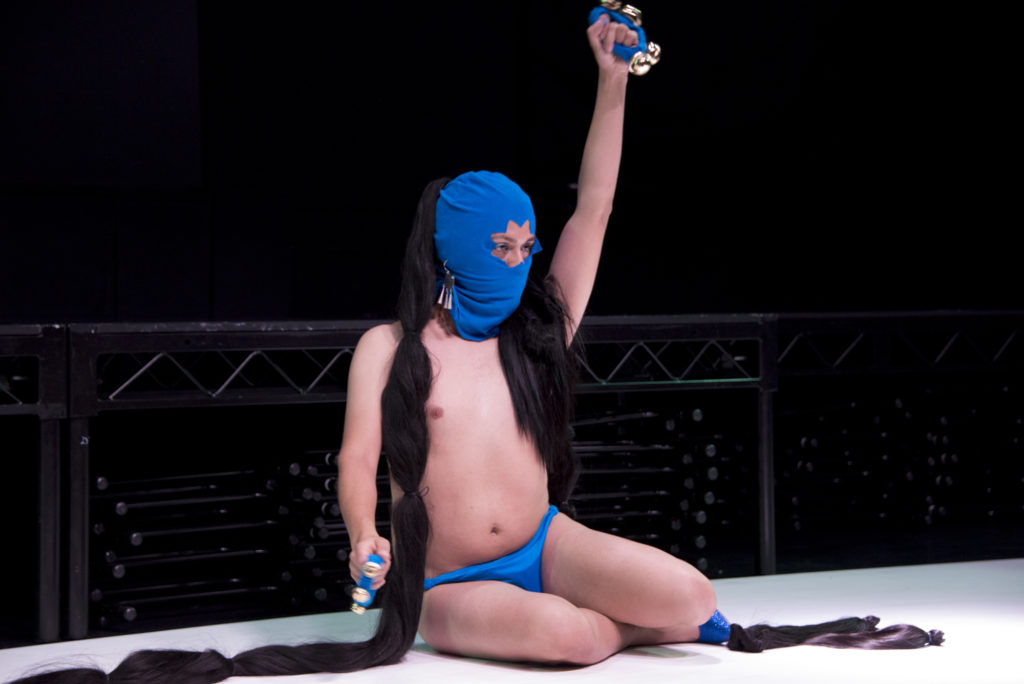
Last Friday (January 10th) was the unofficial start to Our Unlearning Hour, an offshoot of This Decoloniality?, last semester’s K’acha Willaykuna Reading Group. Our Unlearning Hour is a weekly gathering every Friday at 9:30-10:30am (officially starting January 24th), at Heirloom Café at The Wexner Center for the Arts for developing exercises of unlearning grounded in Indigenous Arts and Humanities. Inspired by the visit of Mapuche artist Sebastián Calfuqueo Aliste last November, and in preparation for future K’acha Willaykuna artist residencies, each week we will exchange ideas for unlearning exercises as a community as well as space to discuss short readings and other media resources shared by members of the K’acha Willaykuna group throughout the semester.
At the end of each hour, we will draft a short newsletter (to be sent out the following Monday) with a summary of that morning’s session and links to resources for everyone in the K’acha Willaykuna project (this is a pilot newsletter from last Friday’s unofficial session!). These resources will be brief and accessible, supplementing the more research-focused ongoing bibliography for the project, started in our last session of This Decoloniality? last semester (and available here).
See you at our first Our Unlearning Hour meeting on Friday January 24th.
